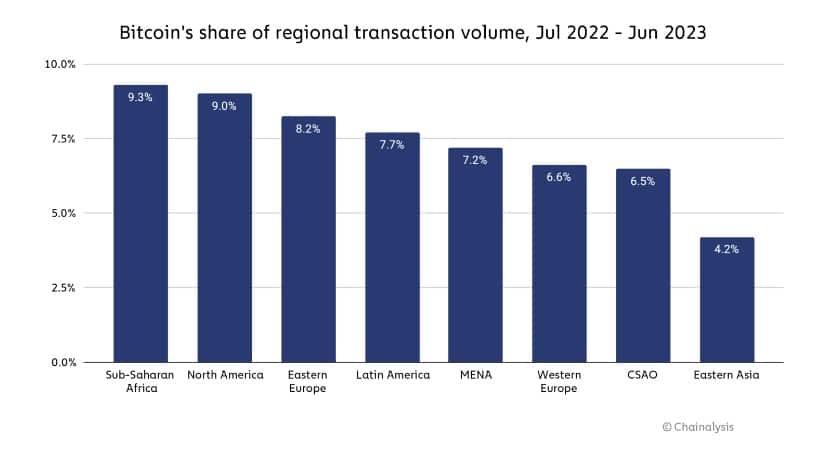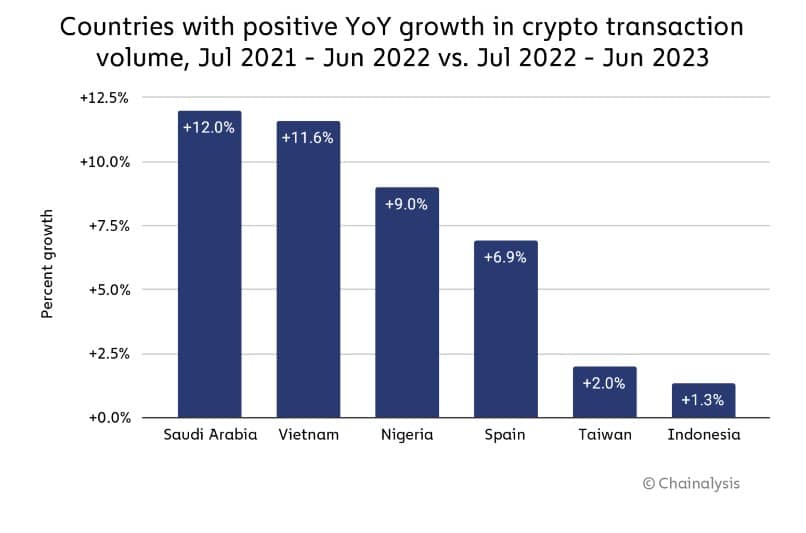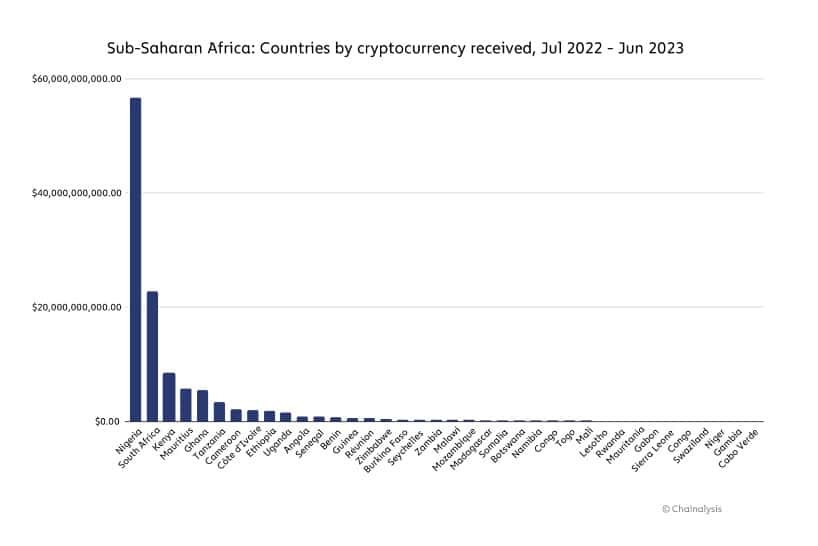Africa is gradually becoming part of the global cryptocurrency dynamic, with Bitcoin at the forefront of addressing the continent’s major economic challenges. As knowledge and use of Bitcoin spreads, innovative educational programs are catalyzing mass adoption. Deciphering
Exponential adoption of Bitcoin in Africa: a response to local challenges
While North America and Eastern Europe are commonly recognized as major centers of cryptocurrency activity, Africa is also demonstrating a notable evolution in this sector. Specifically, sub-Saharan Africa accounts for 9.3% of global Bitcoin transaction volume. Similarly, enthusiasm for Bitcoin is evident in North Africa.
According to a recent study by Chainalysis, from July 2022 to June 2023, crypto transactions in sub-Saharan Africa totalled a colossal $117.1 billion. Nigeria, a major player in this dynamic, alone generated $56.7 billion, almost half of the total volume.
The popularity of cryptocurrencies is also being felt in North Africa, with flagship countries such as Morocco and Egypt. But what are the reasons for this growing adoption?
The benefits of Bitcoin for residents of the African continent are considerable:
- Much cheaper and faster international transfers;
- protection against the devaluation of their local currencies;
- and simplified access to savings, investment and greater financial inclusion, to name but a few.

Evolution of Bitcoin transaction volume worldwide (July 2022 to June 2023)
Nigeria: the epicenter of Bitcoin adoption in Africa
Nigeria stands out not only for its demographics and dynamic economy, but also as Africa’s cryptocurrency spearhead. The figures speak for themselves: from July 2022 to June 2023, the country’s crypto transaction volume reached $56.7 billion, representing almost half of the total for sub-Saharan Africa.
According to a recent Chainalysis report covering fifty countries, Nigeria is among the 6 nations that have shown sustained growth in their cryptocurrency transactions.
With an adoption rate standing at 9%, Nigeria ranks 3rd globally, ahead of Saudi Arabia (12%) and Vietnam (11.6%). It outranks other countries, including Spain, France and even El Salvador.
In the face of Nigeria’s economic challenges, cryptocurrency is emerging as a solid alternative. The Naira crisis of 2022 amplified the search for alternative solutions. The Central Bank’s recasting of the Naira created a liquidity shortage. This, coupled with a record inflation rate of over 20% in early 2023, has driven many Nigerians to Bitcoin and other cryptos.

Nigeria ranks 3rd in terms of cryptocurrency transaction volume growth
Kenya, crypto adoption on the decline
For many years, Kenya has distinguished itself as a pioneer in the adoption of new technologies in Africa. When it comes to cryptocurrencies, the country is frequently ranked among the most dynamic nations on the international scene, a market driven primarily by peer-to-peer transactions.
However, a slowdown in this trend was observed between July 2022 and June 2023. According to Chainalysis, transaction volumes fell to $8.4 billion. This decline took Kenya from 19th to 21st place worldwide, a significant drop from the $20 billion volume recorded the previous year.
Several factors may explain this decline, not least changes in the regulatory environment. In recent times, Kenyan authorities have adopted a more cautious approach to cryptocurrencies.
By way of illustration, Kithure Kindiki, Cabinet Secretary in charge of Home Affairs and National Administration, expressed his concerns about cryptocurrencies in Parliament. He called them potential channels for money laundering and terrorist financing, referring to the WorldCoin affair.
“Cryptocurrency is a possible ground for money launderers and terror financiers,” CS Kindiki tells Ad Hoc Committee investigating Worldcoin activities in Kenya pic.twitter.com/uN67MAcnWj
– Citizen TV Kenya (@citizentvkenya) September 14, 2023
Ghana, between crypto adoption and ban
Ghana is currently going through a difficult economic period. Inflation climbed to an alarming 29.8% in June 2022, a level not seen for 20 years.
Faced with this economic instability, many Ghanaians see Bitcoin as a bulwark to protect their savings. In fact, the country ranks fifth in terms of cryptocurrency transactions in sub-Saharan Africa.
Nevertheless, despite this rise in popularity, cryptocurrencies remain banned in the country. In July 2023, Dr. Amin Adam, Minister of State in the Ministry of Finance, reaffirmed this ban before Parliament, explicitly proscribing banking and financial institutions from any transactions related to crypto-assets.
That said, the Bank of Ghana remains open to modernization. As of 2021, it has launched a pilot project focused on promoting services based on blockchain technology, including money transfers. In addition, it has been working for almost 2 years on the creation of its own central bank digital currency (MNBC), the eCedi.

Volume of cryptocurrency transactions in Sub-Saharan Africa (from July 2022 to June 2023)
South Africa: a proactive regulatory approach
Recognized as a pioneer of crypto regulation in Africa, South Africa has established a regulatory framework conducive to cryptocurrency trading.
Rather than opting for a ban, the country is banking on investor protection. With this in mind, the Financial Sector Conduct Authority (FSCA) introduced a licensing regime for cryptocurrency service providers at the end of 2022, legitimizing these assets as financial products.
This proactive approach has boosted the South African market. From June 2022 to July 2023, cryptocurrency trading volume approached $21 billion. According to Chainalysis rankings, this puts South Africa in 2nd place in sub-Saharan Africa, just behind Nigeria.
Morocco: from crypto ban to obvious adoption
For the past 4 years, the Global Crypto Adoption Index, compiled by Chainalysis, has placed countries such as Nigeria and Kenya among the 20 most advanced nations in cryptocurrency adoption. In the 2022 edition, Morocco has marked its presence by joining this prestigious top 20 for the first time.
Despite a hesitant start, Morocco quickly consolidated its place as a benchmark for the crypto sector in North Africa. According to Chainalysis’ rankings for the MENA region (Middle East and North Africa), the country has climbed to 5th position. This rise is all the more noteworthy considering the Moroccan government’s initial wariness of cryptocurrencies.
However, as Moroccans have become increasingly enthusiastic about these digital currencies, restrictive measures have become less effective. This is evidenced by the proportion of the population holding cryptocurrencies, which has risen from 2.4% in 2021 to 3.1% in 2022, representing the highest rate in North Africa.
Faced with this reality, Banque Al-Maghrib (BAM), the country’s central bank, has deemed it necessary to review its strategy. It is currently exploring a draft law aimed at framing and legitimizing the cryptocurrency sector.
Generally speaking, Africa is asserting itself as a hotbed of cryptocurrency adoption. These digital assets offer significant advantages, such as cheaper international transfers, protection against the depreciation of local currencies, and greater financial inclusion, attracting a growing number of users. But how did we get here?
Education, a lever for cryptocurrency adoption in Africa
Education is key to promoting wider adoption of cryptocurrencies in Africa. Thanks to strong educational initiatives, blockchain technology and cryptos have become more accessible by the general public
Interest in cryptocurrencies is growing across Africa, although there are notable disparities. English-speaking countries such as Nigeria, South Africa and Ghana are leading the way in terms of adoption, compared to their French-speaking counterparts. This trend is partly explained by the predominance of resources available in English, and the historical influence of the English-speaking world in the technology sector.
Indeed, this trend is evident in the decisions of major international crypto companies, who prefer to locate in English-speaking countries.

An expansion of Bitcoin initiatives in Africa
Bitcoin centers, similar to Coinhouse in France, are proliferating across Africa. Senegal, for example, recently inaugurated Bitique, a physical space focused on education as well as the buying and selling of BTC.
In other countries, such as Uganda, Kenya and South Africa, dynamic communities are encouraging Bitcoin adoption through meetings, conferences and other educational events.
Others are working to establish Bitcoin-based circular economies in their respective regions. In fact, we’re preparing a detailed article to highlight these exciting crypto projects that are rocking the continent.
Beyond simply raising awareness, aiming to train developers specialized in Bitcoin, a field requiring ever more advanced technical skills.
A case in point is Qala, recently integrated into BTrust, a Bitcoin development initiative in Africa and India, launched by ex-Twitter CEO Jack Dorsey and American rapper Jay-Z. Their ambition is to train the next generation of Bitcoin and Lightning Network developers on the African continent.
Important Bitcoin events on the horizon
Alongside these initiatives, the African continent is also hosting major events, such as the famous Bitcoin Miami in the United States and Surfin Bitcoin in France. Two major conferences are scheduled for December: Dakar Bitcoin Day in Senegal and the Africa Bitcoin Conference in Ghana.
On this occasion, TCN had the privilege of chatting with Gloire Wanzavalere, co-founder of the Africa Bitcoin Conference. He shared his observations on the development of Bitcoin in Africa:
“Five years ago, Africa’s impact in the Bitcoin universe was unknown. Today, countries like Kenya and Nigeria are leading global adoption, showing that Bitcoin’s success is intrinsically linked to Africa. Bitcoiners are pouring in, and the continent shines with education, mining and vibrant Bitcoin circular economy communities. Today, 3 international conferences are taking place in Africa”.
Note that the Africa Bitcoin Conference, now in its second year, will be held in Accra, Ghana, from December 1-3, 2023. The event promises the participation of leading figures in the Bitcoin world, such as Jack Mallers, CEO of Strike, and Alex Gladstein of the Human Rights Foundation.
